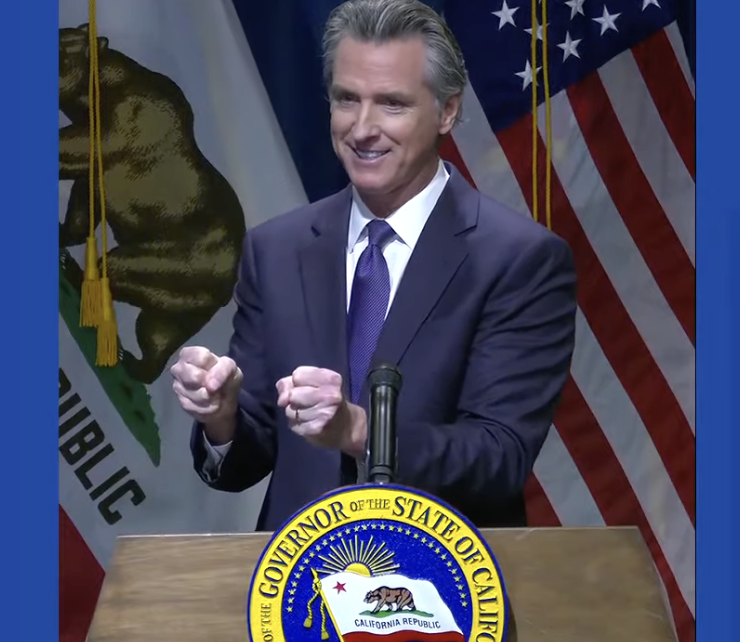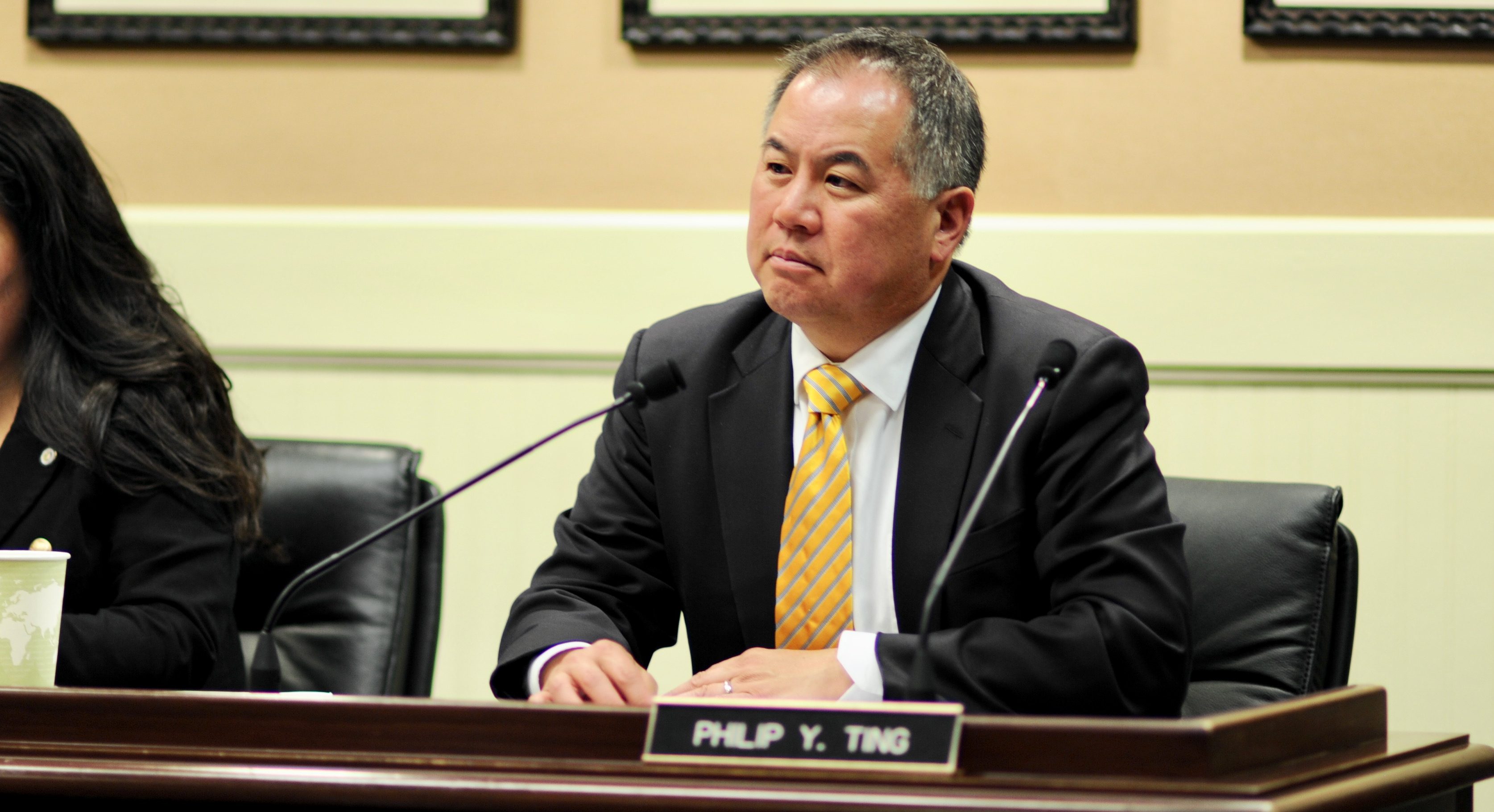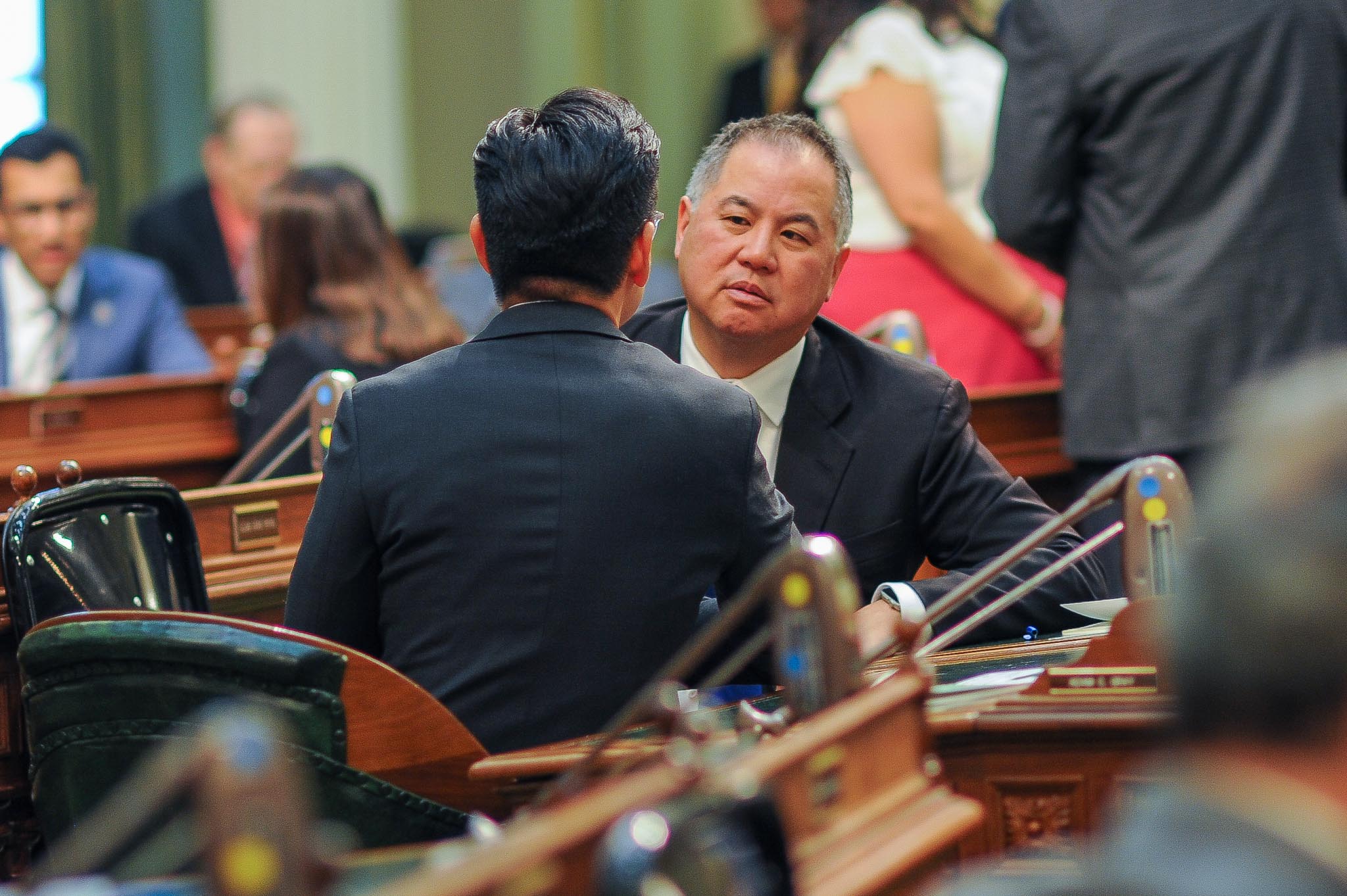
CA Gov. Gavin Newsom presenting 2024-25 budget. (Photo: gov.ca.gov)
Bill To End Legacy & Donor-Preferred Admissions To CA Colleges Signed Into Law By Gov. Newsom
‘If it survives likely legal challenges, it isn’t the cure-all they’ve been hyping’
By Evan Symon, September 30, 2024 12:59 pm
A bill that would ban both legacy and donor preferred admissions at public and private colleges in California was signed into law by Governor Newsom on Monday, finally passing following a previous failed attempt in 2019.
Assembly Bill 1780, authored by Assemblyman Phil Ting (D-San Francisco), will prohibit an independent institution of higher education from providing a legacy preference or donor preference in admissions to an applicant as part of the regular or early action admissions process. The bill will make a violation of the prohibition subject to a civil penalty equal to the amount the independent institution of higher education receives in the year before the violation occurred pursuant to the Cal Grant Program or the Cal Grant Reform Act. AB 1780 will also require the civil penalty to be assessed and recovered by the Department of Justice and deposited into the Cal Grant Account, which the bill would establish in the State Treasury.
In addition, the bill will require funds in the account, upon appropriation by the Legislature, to be available for purposes of funding the Cal Grant Program or the Cal Grant Reform Act, as well as require the department to post the names of the independent institutions of higher education that violate the prohibition on its internet website. Finally, AB 1780 will require, on or before June 30, 2026, and annually thereafter, an independent institution of higher education to report specified information about admitted students to the Legislature.
While the University of California system does not do legacy admissions anymore, as do all public universities in California in recent years, many private colleges sill allow for legacy and donor preferred admissions. This included Stanford’s newest class being over 13% legacy and USC being 14% legacy. Ting noted that those numbers had grown in recent years thanks to shakeups caused by the Varsity Blues admissions bribery scandal and last years’ Students for Fair Admissions v. Harvard Supreme Court case which virtually banned affirmative action in college admissions bumped up legacy and donor preferred admissions. While a previous bill failed in 2019, those new permutations caused Ting to bring back the bill this year.
Opposition to the bill this year, like in 2019, was fierce. Many pointed out that the bill would only worsen diversity levels in colleges, and that legacy and donor admissions are needed to help fund schools, especially those facing budget issues. As legacy students pay full price and donors bring in large sums of money or add new buildings or needed amenities on campus, banning them would hurt universities across the state. Others also noted that those Universities were private, and thus could decide for themselves on what they wanted to do.
Despite those arguments, the bill still moved forward this year. In May, the Assembly voted for AB 1780 55-0, but with a massive 25 vote abstention. This was followed up in August with the Senate passing it 26-5 with 9 abstentions. By now labeled a “revenge bill” by the large number of people opposing it, many had begun writing Newsom to veto the bill. However, the veto didn’t come to fruition, and on Monday, Newsom signed the bill into law.
California is banning legacy and donor admissions at private colleges to advance access to higher education.
Everyone should be able to get ahead through merit, skill, and hard work, and we’re opening the door wide enough for everyone, fairly. https://t.co/5V6619Xnry
— California Governor (@CAgovernor) September 30, 2024
“In California, everyone should be able to get ahead through merit, skill, and hard work,” said Newsom in a statement on Monday. “The California Dream shouldn’t be accessible to just a lucky few, which is why we’re opening the door to higher education wide enough for everyone, fairly.”
Assemblyman Ting added that “If we value diversity in higher education, we must level the playing field. That means making the college application process more fair and equitable. Hard work, good grades and a well-rounded background should earn you a spot in the incoming class – not the size of the check your family can write or who you’re related to. I thank the Governor for agreeing with me and supporters of AB 1780 – that every student deserves a fair shot at their dream school.”
However, college and university admissions experts now expect even more major fluctuations in the coming years, as well as negative effects.
“So the end of affirmative action last year, some colleges eliminating test scores, and the federal crackdown on admissions policies following that Varsity Blues Scandal all have really shocked the system in recent years,” said college admissions specialist Dorothy Wagner to the Globe on Monday. “California has been a different animal though. Affirmative action has been dead in the state since 1996, not 2023. And UC got rid of their legacy admissions in 1998, although they took a hit in donations for awhile after until legacy people found new ways to get their kids in.
“If these schools don’t want to miss out on donors and gifts from alumni and donors who want a student in there, they’ll find a way to get them in. After all, less money coming in means less money for scholarships, which hurts many lower income students who got in the first place because of the changes to the system. AB 1780, you know, they say it is about leveling the playing field, but really it just takes away one path for legacy and donor students who want to get in. Look at Varsity Blues, where rich students got in through being on athletic teams despite no real athletic abilities. There’s other creative ways that are happening.
“AB 1780, if it survives likely legal challenges, isn’t the cure-all they’ve been hyping. They just really don’t want to admit that there are so many other ways.”
First new admissions statistics post AB 1780 are to come out in mid-2026.
- Rep. Kiley to Introduce Bill to Eliminate All Federal Funding For California High-Speed Rail Authority - December 11, 2024
- Trump Selects CA Lawyer Harmeet Dhillon As Assistant Attorney General For Civil Rights - December 11, 2024
- San Francisco Cruise Robotaxi Folds Following $10 Billion In Losses - December 11, 2024




As a wealthy Harvard grad who lives the high life in San Francisco, this legislation should mean that Democrat Assemblyman Phil Ting’s two daughters and other family members won’t be able to rely on Ting’s wealth and past connections to get them into Harvard, Stanford or other top universities? In reality, this legislation won’t affect California’s Democrat legislators (aka criminal Democrat mafia) because the laws they pass never apply to them?
(https://www.philting.com/)
Ting’s children will probably get in based on merit due to having access to the best education and opportunities money can afford. That’s not a ‘criminal Democratic mafia’ problem, that’s just the reality of the American system. The wealthy simply have better opportunities. But if his daughters don’t take school seriously then, because of this law, they won’t be admitted into Stanford, etc.
Also Harvard is in Massachusetts and not effected by this law, so very weird of you to bring that up…
Anyway you slice it this is a good law.
No, @CB. The law is, as usual, based on the false premise that (1) a “legacy” student takes away a slot from a deserving “less-privileged” student and (2) the school community will be “improved” through the left’s doctrine of diversity, equity and inclusion (DEI). This is another left-wing law that will be overturned by the courts. Here is a good discussion of why, fyi:
https://www.washingtonpost.com/opinions/2023/08/21/legacy-admissions-colleges-diversity/
What exactly is a “well-rounded background”? Please send your college applications to Phil Ting, only he is qualified to determine who gets admitted and who is rejected.
What happens to an underprivileged or hardship background college applicant who has letter of recommendation from an alumni or a large private donor?
Safest course of action: reject the application.
If only these restrictions on college admission decisions had been in effect when Gavin Newsom left high school? Community College would have been the beginning and the end of his college career.
Gov. Newsom, Assemblymember Ting want to level the playing field and give everyone a fair shot at the California dream.
Next step for Newsom, Ting and co-horts is declare they will accept $50 maximum individual campaign donation per year. Anything more will be returned to the donor.
No need to wait for new law. No large campaign donations. No preferences for donors.
Level the playing field now.